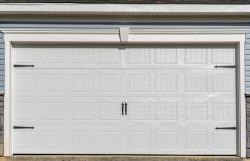Common Garage Door Problems and How to Troubleshoot Them
 Common Garage Door Problems and How to Troubleshoot Them
Common Garage Door Problems and How to Troubleshoot Them
The garage door is an essential part of any home’s security, keeping your vehicles and other valuable items safe from burglars and natural elements alike. However, many homeowners tend to take their garage doors for granted until they start experiencing issues. A malfunctioning garage door can be an inconvenience, a safety hazard, and an unexpected expense if not addressed promptly.
Luckily, most garage door problems come with noticeable symptoms that signal their underlying issues. With some basic knowledge and troubleshooting tips, you can often diagnose and fix many garage door issues. Below are some of the most common garage door problems and how to troubleshoot them.
1. The door doesn’t open or close
If your garage door refuses to budge, it could be due to several reasons. First, check if the door is properly connected to power and that the opener is receiving power. If those seem okay, check if your remote control has fresh batteries and is within range. If both the opener and remote are powered up, but the door still doesn’t budge, it might be a mechanical problem.
The most common mechanical issues that can cause a stuck garage door include broken springs, worn cables, loose or damaged tracks, and rusty or jammed rollers. If you’re unsure how to assess these components, it’s best to call a professional garage door technician to inspect and repair them.
2. The door makes loud or strange noises
Garage doors can create a range of noise, from subtle humming sounds to louder rattling and grinding. However, if your garage door starts to produce unusual or excessively loud noises, it could indicate that something is wrong. Often, noise is an indication of wear and tear or a loose component.
One common cause of a noisy garage door is worn-out or damaged rollers. Rollers are small wheels that enable the door to move up and down on the tracks. When rollers become worn, they can produce squeaking and grinding sounds, and may even cause the door to become misaligned or off-balance. Replacing these rollers is often a quick and inexpensive fix.
Another culprit of noisy garage doors is loose hardware. The garage door system has various nuts, bolts, and screws, which can easily loosen over time due to vibration and use. If you notice rattling or other strange noises, try tightening all the hardware, including the hinges, track brackets, and opener bracket.
3. The door opens or closes too slowly
A garage door that moves sluggishly can be frustrating and leave you feeling trapped in or out of your home. Several factors can cause slow garage doors, including damaged or worn-out tracks, jammed rollers, or dirty, worn-out gears or lubrication issues. Additionally, garage doors can slow down due to incorrect opener settings.
If your garage door opener has speed settings, ensure that they are set to the appropriate speed and mode. Ensure that the opener’s lubrication needs are met, as inadequate lubrication can cause the garage door to move slowly or become stuck. Oil the moving parts regularly with quality garage door lubricant, and clean the gears and track of accumulated dirt or debris.
4. The door closes and then immediately reverses
If your garage door starts to close but suddenly reverses without any obstructions, it could be due to a malfunctioning auto-reverse feature. The auto-reverse feature is part of the garage door opener safety system that prevents the door from crushing or injuring anything in its path.
The auto-reverse feature works by sending a signal to the opener to reverse the door if anything interrupts the door’s safety beam. If your garage door begins to reverse without any interferences, the safety sensors might be experiencing some malfunction. Inspect the sensors to ensure that they are clean and aligned with each other. If the sensors are in good condition, it might be an issue with the opener’s settings or the sensor wiring. In this case, call a professional garage door contractor to have the issue fixed.
Final Thoughts
Although garage door issues can be concerning, many are relatively simple to diagnose and troubleshoot. However, if you experience any difficulty, any DIY maintenance task is likely best left to the expertise of a professional garage door contractor. When it comes to any complex garage door repair or installation, be sure to contact a trusted, expert garage door technician who can diagnose the problem quickly and restore your garage door back to its optimal condition.
Categorised in: Garage Door Maintenance, Garage Door Repair






 Common Garage Door Problems and How to Troubleshoot Them
Common Garage Door Problems and How to Troubleshoot Them